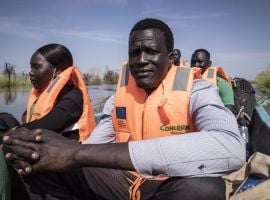
Knowledge Hub
An eco stove: the gift that keeps on giving in Sierra Leone

It really doesn’t look like much – two men and a woman on a crumbling concrete porch hammering and bending bits of old metal into seemingly random shapes. But this is what transformation looks like.
An old oil drum, from the words embossed on its side probably originating in France, is changing form into something which will positively impact the lives of these three people, their families, their neighbors and – in its own small way – the planet on which they live those lives.
A low-tech "wonder"
“Every day I would spend hours in the forest, cutting wood, and making coal to sell in Masimbi. I don’t have to do that now,” says Marie Sesay, one of the people working on the oil drum. What they are doing is making “wonderstoves” – at least that’s what they seem to have been christened in these parts. We’re in Tonkolili, Sierra Leone.

Technically they’re called eco-stoves and the concept, as explained by Concern’s Samuel Masimbi, is simple. “People here traditionally used three stones and firewood or charcoal (the “coal” Marie referred to) for cooking, which is really very wasteful of fuel. The eco-stove is much more energy efficient.”
In a nutshell, an eco-stove allows a much greater degree of control over air intake and temperature by keeping the fire in an enclosed environment and using a damper system. Also, metal stoves are much better conductors of heat and help to reduce the risk of accidental burning from stray embers.
They can be made from all sorts of scrap metal – old cars, bits of machinery, even roofing.
Concern helped us at the start with training and materials. Now kids go around collecting metal and we buy it from them.
New money
While the technology may be pretty simple, the impact is really impressive. Scrap metal is recycled at very little cost and provides an income for those involved in manufacturing process. “The stoves we are building we sell in neighboring communities and in places like Kono,” explains Isse Conteh. “I was a farmer before I started this – and I still do some farming – but this is my main job now.”
For those who use the stoves, life is changed too. Marie herself is one of them. “We have less work fetching wood, and now charcoal lasts for a month, so people spend less money.” And the money she makes on sales goes towards paying for her children’s school fees.
I am willing and ready to help other women. I have benefited and I would like to pass on my knowledge to others.

Win win situation
Then there’s the spinoff for our precious and beautiful planet. Deforestation is a major problem in Sierra Leone and trees provide not only the effect of a green “lung” to ingest pollution, but also act as an anchor to the soil during the torrential downpours of the rainy season. The deadly dangers of landslides have become abundantly clear in recent times. Also, less wood burnt means less air pollution, both in the home and in the atmosphere (the impact on health of domestic cooking smoke in developing countries is actually a very serious problem.)

So this is a win win win situation for everyone – and proof that transformation need not be spectacular or high tech. In this case the irony of a container for one destructive fossil fuel becoming the crucible for more sustainable energy production is pretty sweet.
Kieran McConville
Communications Officer






